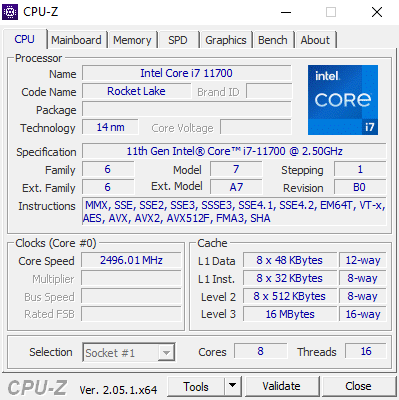Comparing: Intel Core i9 11900F vs Intel Core i7 11700
In this comparison, we analyze two Processors: Intel Core i9 11900F and Intel Core i7 11700, using synthetic benchmark tests to evaluate their overall performance. This side-by-side comparison helps users understand which hardware delivers better value, speed, and efficiency based on standardized testing. Whether you're building a new system or upgrading an existing one, this benchmark-driven evaluation offers valuable insights to guide your decision.
Specification Comparison Table
| Specification | Intel Core i9 11900F | Intel Core i7 11700 |
|---|---|---|
| Architecture | x86 | x86 |
| Technology | 14 nm | 14 nm |
| Clock | 2.5 GHz - 5.2 GHz | 2.5 GHz - 4.9 GHz |
| Core/Thread | 8 / 16 | 8 / 16 |
| Segmen | Desktop | Desktop |
Submission Comparison Table
| Benchmark Software | Intel Core i9 11900F | Intel Core i7 11700 |
|---|---|---|
| Cinebench - R15 |
2034 cb |
2153 cb |
About Hardware Intel Core i9 11900F
Part of the Rocket Lake generation, the Intel Core i9-11900F is a high-performance desktop processor released in 2021. This CPU has 8 cores and 16 threads, with a base clock speed of 2.5 GHz, and can increase to 5.2 GHz using Intel Turbo Boost Max 3.0.
Built with 14nm fabrication, the i9-11900F has a TDP of 65W in default mode, but can increase under high workload conditions. As it is an “F” variant, this processor does not have an integrated GPU, so it requires a discrete graphics card for display output. With the Rocket Lake architecture, the i9-11900F brings an IPC (Instructions Per Cycle) increase over the previous generation, so it has strong single-core performance. However, as it is still based on a 14nm process, its power efficiency is lower than the latest AMD Ryzen processors using 7nm fabrication, especially in intensive multi-threaded workloads.
Monday, 20 June 2022 07:37:04 | Update: 1 week ago
About Hardware Intel Core i7 11700
Part of the Rocket Lake family, the Intel Core i7-11700 is a high-performance desktop processor released in 2021. It has 8 cores and 16 threads, with a base clock speed of 2.5 GHz and can increase to 4.9 GHz with Turbo Boost.
Built on 14nm fabrication, the i7-11700 brings architectural improvements over its predecessor, with higher IPC (Instructions Per Cycle). The processor has a TDP of 65W, but it can increase under high workload conditions.
In terms of graphics, the i7-11700 uses Intel UHD Graphics 750, which supports 4K video playback and some light gaming. However, for more serious gaming, the use of a discrete graphics card is still required.
With its strong multi-threaded performance, the i7-11700 is suitable for gaming, video editing, and other heavy tasks. However, since it is still 14nm-based, its power efficiency is not as good as the latest AMD Ryzen processors that use smaller fabrication.
Hardware Detail:
Monday, 05 June 2023 13:51:38 | Update: 1 week ago


